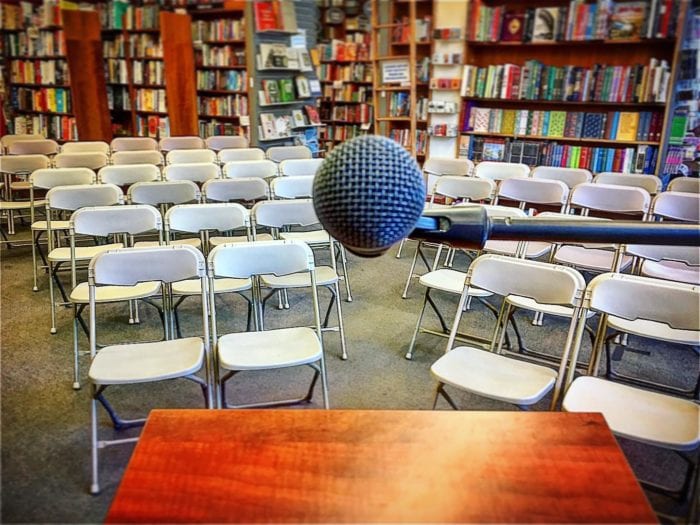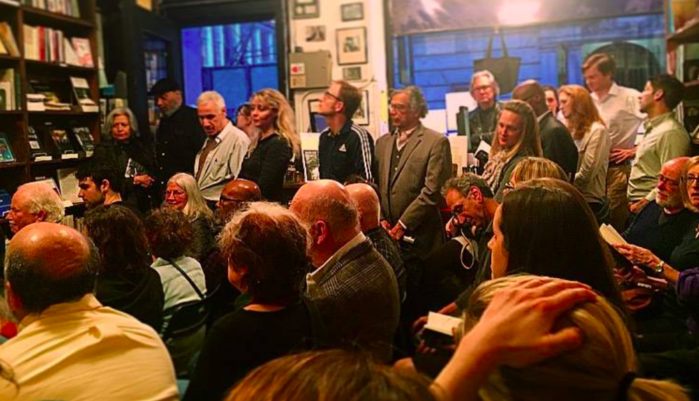
“In a tactile way, things feel lovely and serene and intriguing. You’re led from one place to the next through your own imagination and inclination to explore and discover.”
The last several months have tested the resolve of small business owners across the country. Things have been particularly hard for bookstores and libraries, some of which still remain closed to the public.
As the pandemic continues, significant shifts are taking place, with some lived experiences replaced by virtual ones. Readers have increasingly looked to online vendors and digital formats, while the pandemic exacerbated the problems that already threatened the existence of small brick and mortar shops, which have been compelled to find new and exciting ways to connect with customers.
Mostly, though, even with boosts from the popularity of books in the orbit of select topics like the Black Lives Matter movement, irreversible damage has been done. Still, people go into the book biz for a love of reading and community. If anything, these tough times have solidified their belief that while consumption habits might evolve, physical books and spaces that celebrate reading must stay open.
We spoke with bookstore owners around Boston, as well as people from the Boston Public Library, to see how they have fared, and to gauge where local outfits are at this excruciating moment.
Safety first
Ken Gloss, the owner at Brattle Book Shop in Downtown Crossing, one of the oldest used and rare bookstores in the US, has started going to houses and estates to appraise collections again. He wears a mask and gloves, but in some cases, the visits take a uniquely hands-off approach. Gloss said that one client emailed him a map of her house.
“When we got there, she sat in her car in the driveway,” he said.
After appraising the collection, Gloss gave her a call and fixed a price.
“We moved the books. As we were leaving, she got out of the car and went back to her house.”
At Brookline Booksmith, owner and manager Lisa Gozashti still can’t believe the reality. As she looks at Harvard Street from her store window, people go about their regular work, but in masks that cover half of their faces. The Booksmith, which reopened on June 25, has various safety guidelines in place. They’ve reduced the number of people working in the store at a time; those working are supposed to take their temperatures at the beginning of their shifts; and everybody is required to continuously sanitize the surfaces.
At Harvard Book Store, management had to remove the beloved displays near the front to make more room for distancing. Alex Merriwether, the general manager, misses how those tables led customers to discover unexpected gems.
“It’s a bit heartbreaking,” he said.

Virtual horizons
The Booksmith launched a new website on Aug 1 and is working toward keeping up momentum with its online sales going. The shift from buying books at stores to online portals has been happening for years, and for the store, Gozashti said online sales already increased by 100% in 2019. After the store shut its doors to customers in March, online orders increased even more, and so it needed the nicer, friendlier online destination.
To keep up with its regulars, Harvard Book Store launched a second weekly email, as well as a section on its website that features all new arrivals. The online presence and parsing of sections, according to Merriwether, is made to reflect the in-store browsing experience as much as possible. “We understand that some people are going to shop online,” he said. “But that doesn’t mean you’ve to shop with a corporation that doesn’t care about books.”
At Grolier Poetry Bookshop in Cambridge, manager Ndidi Menkiti, said they email newsletters and curated book recommendation lists to customers weekly and said the shop’s affiliation with bookshop.org, one of the leading e-commerce portals for independent retailers, has been a welcome support. Meanwhile, bookstores and libraries have also expanded their electronic collections, which they were already growing prior to the pandemic. Michael Colford, the director of library services for the Boston Public Library, said that the last quarter of 2019 saw their e-book lending outpace physical book lending.
To keep the romance going between readers, stores, and authors, all the institutions herein are continuing to realize the scope of the expansive virtual world by hosting readings and other events online. For BPL, Colford said that doing so has helped the library reach a larger crowd, which can be tough when organizing events at the library. The conversation with newscaster Dan Rather, for example, attracted a virtual viewership of 1,000.
Through the Booksmith’s Transnational Literature Series, Gozashti said the staff there recognized the unbelievable potential of the platform. “We could have a writer in Mexico being in conversation with a writer in Canada, being in conversation with someone who’s in San Francisco,” she said. “That is really, really thrilling for us and an unexpected silver lining.”
Still, some are reluctant to attempt to replace the experience of an intimate space using cold, flat screens. Menkiti said Grolier is considering Zoom readings, or possibly hosting events in a bigger space that could accommodate more people while following social distancing guidelines, but has so far abstained. Even though the Booksmith has a schedule of online events, Gozashti said the quarantine has made her realize the importance of the serendipitous experiences bookstores provide.
“There’s comfort here,” she said. “In a tactile way, things feel lovely and serene and intriguing. You’re led from one place to the next through your own imagination and inclination to explore and discover.”
Road ahead
The Black Lives Matter factor is real for some bookstores. At Frugal Bookstore in Nubian Square, owners Clarrissa and Leonard Egerton have spoken about the help as well as hurdles that have come with an influx in orders for books such as How to Be an Antiracist by Ibram X. Kendi. In addition to driving sales, many noted that the emergence of these bestsellers will beget larger changes in the publishing world.
“We’re going to see much more diversity, much more depth and richness across multiple forms of voices going forward,” Gozashti said. “I actually feel like change is coming—real change. And that it can happen and that books can support that change makes us all feel so privileged to be a part of that work in any small way.”
Financial woes will continue; that’s more or less guaranteed at this point. Fortunately, none of them are in it for the money. What’s important is that they keep the cultural and personal values of the store alive.
For Menkiti, an attorney who took over some of the management at the Grolier after her father, Ifeanyi Menkiti, passed away in 2019, the main job is to preserve the love that her parents had for literature and cross-cultural connections, which she shares as well.
“My dad bought the store in 2006 to keep it from closing,” Menkiti said. “He personally, financially, donated a lot, over the years, just to keep it open for its historic and cultural value. Independent brick and mortar bookstores would be the luckiest if they could remain solvent in the best of times.”
Gloss echoed the sentiment. If he didn’t own the building that houses the Brattle, he couldn’t have paid its rent even before the pandemic. “We’re hopeful each week if we get enough to pay expenses,” he said.
“We will be here. Next month, next year, as long as we stay healthy.”
Mita Kataria is a graduate student in journalism at Boston University.

